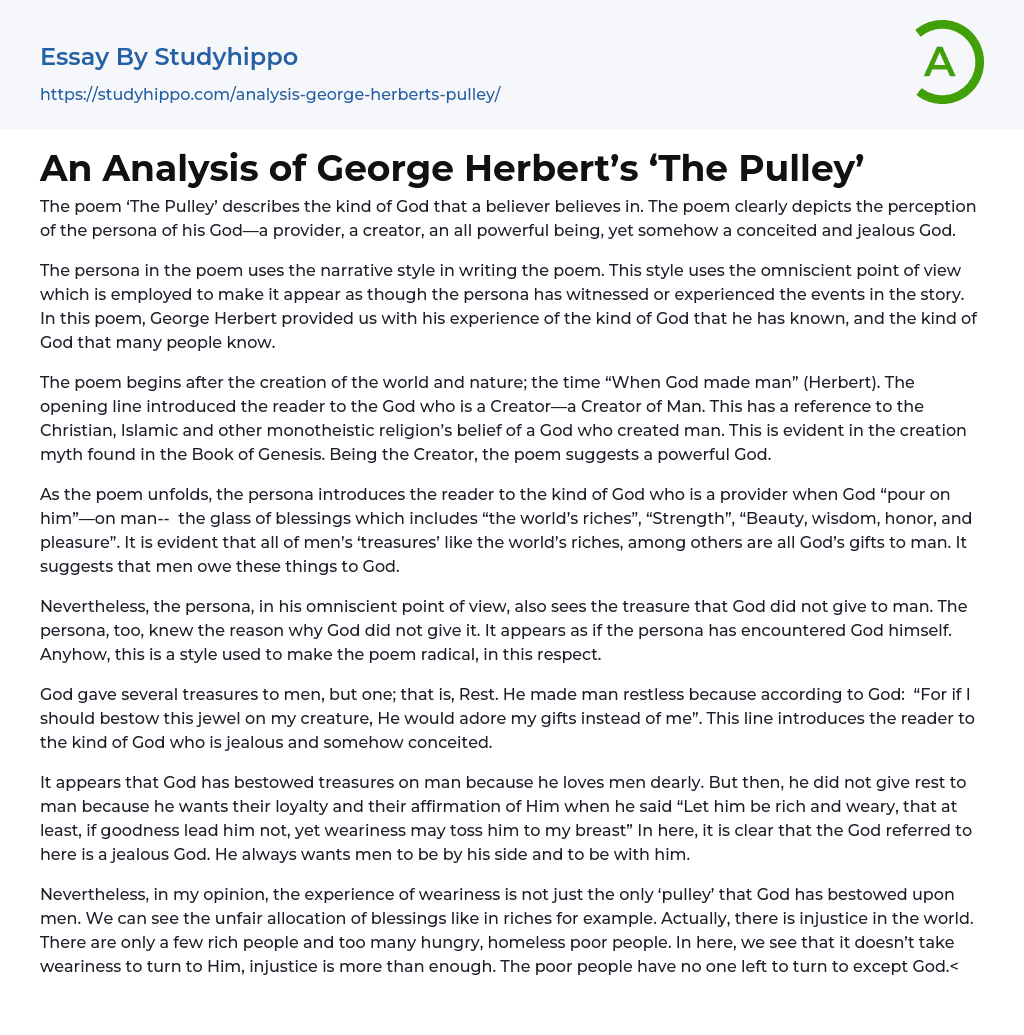

An Analysis of George Herbert’s ‘The Pulley’ Essay Example
The poem ‘The Pulley’ describes the kind of God that a believer believes in. The poem clearly depicts the perception of the persona of his God—a provider, a creator, an all powerful being, yet somehow a conceited and jealous God.
The persona in the poem uses the narrative style in writing the poem. This style uses the omniscient point of view which is employed to make it appear as though the persona has witnessed or experienced the events in the story. In this poem, George Herbert provided us with his experience of the kind of God that he has known, and the kind of God that many people know.
The poem begins after the creation of the world and nature; the time “When God made man” (Herbert). The opening line introduced the reader to the God who is a Creator—a Creator of Man. This
...has a reference to the Christian, Islamic and other monotheistic religion’s belief of a God who created man. This is evident in the creation myth found in the Book of Genesis. Being the Creator, the poem suggests a powerful God.
As the poem unfolds, the persona introduces the reader to the kind of God who is a provider when God “pour on him”—on man-- the glass of blessings which includes “the world’s riches”, “Strength”, “Beauty, wisdom, honor, and pleasure”. It is evident that all of men’s ‘treasures’ like the world’s riches, among others are all God’s gifts to man. It suggests that men owe these things to God.
Nevertheless, the persona, in his omniscient point of view, also sees the treasure that God did not give to man. The persona, too, knew the reason why
God did not give it. It appears as if the persona has encountered God himself. Anyhow, this is a style used to make the poem radical, in this respect.
God gave several treasures to men, but one; that is, Rest. He made man restless because according to God: “For if I should bestow this jewel on my creature, He would adore my gifts instead of me”. This line introduces the reader to the kind of God who is jealous and somehow conceited.
It appears that God has bestowed treasures on man because he loves men dearly. But then, he did not give rest to man because he wants their loyalty and their affirmation of Him when he said “Let him be rich and weary, that at least, if goodness lead him not, yet weariness may toss him to my breast” In here, it is clear that the God referred to here is a jealous God. He always wants men to be by his side and to be with him.
Nevertheless, in my opinion, the experience of weariness is not just the only ‘pulley’ that God has bestowed upon men. We can see the unfair allocation of blessings like in riches for example. Actually, there is injustice in the world. There are only a few rich people and too many hungry, homeless poor people. In here, we see that it doesn’t take weariness to turn to Him, injustice is more than enough. The poor people have no one left to turn to except God.
Furthermore, there is also injustice when it comes to the allocation of beauty. Some people are good looking while some are not. This is also an
unfair reality that is silent in this poem of Herbert. Herbert only focused on one ‘pulley’ besides the many pulleys.
The experience of weariness has many explanations. In religion, some would say that people experience restlessness because of lack of faith. This is evident when people enter priesthood or a religious order so that they would strengthen their faith in God. In science, some would say that the experience of restlessness or weariness is that men have not reached yet the fullness of evolution that’s why they experience restlessness.
Restlessness is associated with punishment. This was evident in ‘Macbeth’, a play of Shakespeare. As a punishment for the crime committed, Lady Macbeth became restless or sleepless. In Herbert’s poem, restlessness is a tool of God in order than men should turn to him or to worship him instead of worshipping the worldly things.
The poem is different in the sense that it employed a ‘pulley’ which is a mechanical tool in order to convey his description of a God. There was a concoction of faith and science, and that made the poem so unique from the other metaphysical poems.
All and all, George Herbert’s metaphysical poem ‘The Pulley’ presented the reader with a theistic description of God—a God who is a creator, a provider, an all powerful God, but yet a jealous, and a conceited one.
Work Cited
Herbert, George. The Pulley. www.ccel.org. No date of publication. 30 May 2007. <http://www.ccel.org/h/herbert/temple/Pulley.html>
- Spirituality essays
- Angel essays
- Afterlife essays
- Atheism essays
- Bible essays
- Buddhism essays
- Christian Worldview essays
- Christianity essays
- Confession essays
- Cosmological Argument essays
- Deism essays
- Devil essays
- Existence of God essays
- Faith essays
- Freedom Of Religion essays
- God essays
- Hinduism essays
- Immortality essays
- Islam essays
- Jainism essays
- Jews essays
- Judaism essays
- Miracle essays
- Monk essays
- Monotheism essays
- New Testament essays
- Old Testament essays
- Pilgrimage essays
- Puritans essays
- Revelation essays
- Ritual essays
- Salvation essays
- Sin essays
- Sinners essays
- Soul essays
- Taoism essays
- Temple essays
- Theology essays



